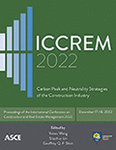Research on Dynamic Evaluation of Organizational Effectiveness for Construction Enterprises under “Carbon-Peak and Carbon-Neutralization” Strategies
Publication: ICCREM 2022
ABSTRACT
Under the guidance of the “carbon-peak and carbon-neutralization” strategy, we recognize and evaluate the organizational effectiveness of construction enterprises, which lay a solid foundation for achieving the strategic goal of carbon neutrality by 2060. Organizational effectiveness refers to the organization’s ability to achieve strategic goals and the degree of completion. It is a comprehensive evaluation for the enterprise from the two dimensions of output and capability. This article identifies and confirms the factors that affect the organizational effectiveness of construction enterprises by investigating many of construction enterprises and using system dynamics theories to analyze and determine the causal relationship among the factors. Then we draw a causal relationship diagram to identify the index system that affects the organizational effectiveness of construction enterprises and construct a dynamic evaluation model of organizational effectiveness. Finally, we try to provide some reasonable suggestions for construction companies to rationally allocate resources under “carbon-peak and carbon-neutralization” strategy, and to improve their overall process management capabilities.
Get full access to this article
View all available purchase options and get full access to this chapter.
REFERENCES
Gidado, K. I. (1996). “Project complexity: The focal point of construction production planning.” Construction Management and Economics, 14(3), 213–225.
Gong, Z. (2020). Research on the Influencing Mechanism of Technological Innovation in Construction Enterprises Based on System Dynamics. Shandong University, Shandong, China, 1–95. (in Chinese).
He, Y. (2020). “Study on the influencing factors and countermeasures of cost management in construction Enterprises: Taking TB enterprises as an example.” Money China, (04), 86–87. (in Chinese).
Holmqvist, M. (2003). “A dynamic model of infra- and interorganizational learning.” Organization Studies, 24(1), 95–123.
Keegan, A., and Turner, J. R. (2002). “The management of innovation in project-based firms.” Long Range Planning, 35(4), 367–388.
Li, D. (2020). Research on Dynamic Evaluation of Organizational Effectiveness in Agricultural Enterprises. Jilin University, Jilin, China, 1–172. (in Chinese).
Liu, W. Z. (2021). “Improvement path of performance appraisal system of state-owned construction enterprises.” Modern Enterprise, (12), 54–55. (in Chinese).
Lopez, L. A., Cadarso, M. A., Zafrilla, J., and Arce, G. (2019). “The carbon footprint of the US multinationals’ foreign affiliates.” Nature Communications, 10, 1672.
Shan, Y. L., Guan, D. B., Zheng, H. R., Ou, J. M., Li, Y., Meng, J., Mi, Z. F., Liu, Z., and Zhang, Q. (2018). “Data descriptor: China CO2 emission accounts 1997-2015.” Scientific Data, 5, 170201.
Stave, K., Zimmermann, N., and Kim, H. (2021). “Special issue of system dynamics review ‘Qualitative aspects of system dynamics modeling’.” System Dynamics Review, 37(2-3), 245–246.
Tollman, P., Panier, V., Dosik, D., Biondi, P., and Cuss, F. (2016). “Organizational effectiveness: A key to R&D productivity.” Nature Reviews Drug Discovery, 15(7), 441–442.
Wang, C. M., and Tian, M. L. (2006). “The study on design and implementation framework of strategic human resource scorecard.” Science Research Management, (04), 130–137. (in Chinese).
Zhang, Z. K., Guan, D. B., Wang, R., Meng, J., Zheng, H. R., Zhu, K. F., and Du, H. B. (2020). “Embodied carbon emissions in the supply chains of multinational enterprises.” Nature Climate Change, 10(12), 1096–U32.
Zhang, Q., Oo, B. L., and Lim, B. T. H. (2019). “Drivers, motivations, and barriers to the implementation of corporate social responsibility practices by construction enterprises: A review.” Journal of Cleaner Production, 210, 563–584.
Zhao, Z. Y., Zhao, X. J., Davidson, K., and Zuo, J. (2012). “A corporate social responsibility indicator system for construction enterprises.” Journal of Cleaner Production, 29-30, 277–289.
Zhu, G. J. (2007). Value Chain Management of Construction Enterprises Based on Information Technique. Beijing Jiaotong University, Beijing, China, 1–155. (in Chinese).
Information & Authors
Information
Published In
History
Published online: Dec 15, 2022
Authors
Metrics & Citations
Metrics
Citations
Download citation
If you have the appropriate software installed, you can download article citation data to the citation manager of your choice. Simply select your manager software from the list below and click Download.
